Aside from whole grains, vegetable oils and margarine are some of the most misunderstood and over-recommended foods in the health community. You’ve probably heard these referred to as “heart-healthy oils,” a good alternative to those “artery-clogging saturated fats.”
Only one problem…. science doesn’t back these claims up!
Vegetable oils are found in practically every processed food, from salad dressing to mayo to conventional nuts and seeds. These oils are some of the most harmful substances you can put into your body, but more on that in a minute!
What Are Vegetable Oils/Margarine?
Vegetable oils (and margarine, made from these oils) are oils extracted from seeds like the rapeseed (canola oil) soybean (soybean oil), corn, sunflower, safflower, etc. They were practically non-existent in our diets until the early 1900s when new chemical processes allowed them to be extracted.
Unlike butter or coconut oil, these vegetable oils can’t be extracted just by pressing or separating naturally. They must be chemically removed, deodorized, and altered. These are some of the most chemically altered foods in our diets, yet they get promoted as healthy.
How Vegetable Oils Are Made
Vegetable oils are manufactured in a factory, usually from genetically modified crops that have been heavily treated with pesticides.
Take for instance the common canola oil, the beauty queen of the vegetable oil industry. It was developed by making a hybrid version of the rapeseed, and it was given its name in the 1980s as part of a marketing effort organized by a conference on mono-saturates.
Rapeseed oil contains high amounts of the toxic erucic acid, which is poisonous to the body. Canola oil is an altered version, also called Low Erucic Acid Rapeseed (LEAR) and it is commonly genetically modified and treated with high levels of pesticides.
Canola (modified rapeseed oil) is produced by heating the rapeseed and processing with a petroleum solvent to extract the oil. Then another process of heat and addition of acid is used to remove nasty solids (wax) that occur during the first processing.
At this point, the newly created canola oil must be treated with more chemicals to improve color and separate the different parts of the oil. Finally, since the chemical process has created a harsh smelling oil, it must be chemically deodorized to be palatable.
Hydrogenated Oil
If the vegetable oil is going to be made into shortening or margarine, it undergoes an additional process called hydrogenation to make it solid at cold temperatures. Unlike saturated fats (butter, coconut oil, etc.) vegetable oils are not naturally solid at these temperatures and must be hydrogenated to accomplish this. During this process of hydrogenation, those lovely trans fats we’ve heard so much about are created.
This chart from this informative article on the history and production of canola oil shows the process in more detail:
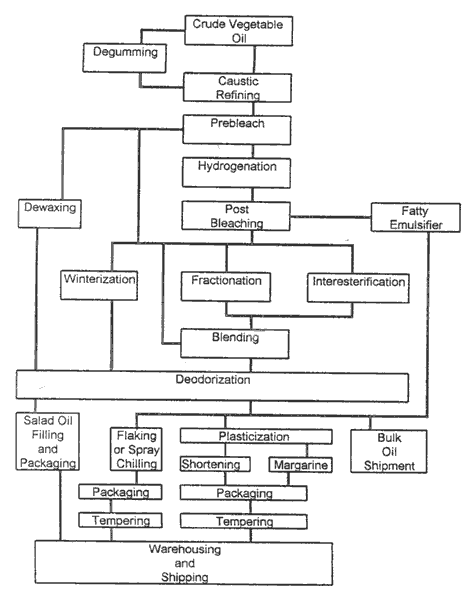
Nothing like petroleum produced, overheated, oxidized, and chemically deodorized salad dressing for dinner…. yum.
(Compare that to butter… Step 1: milk cow. Step 2: let cream separate naturally. Step 3: skim off cream. Step 4: shake until it becomes butter.)
This article has fascinating videos contrasting the production of vegetable oils and butter.
History of Vegetable Oil Production and Consumption
As I mentioned, vegetable oil was practically non-existent in its current form in the early 1900s. Until that time, most people got their fats from animal sources like meat, tallow, lard, butter, cream, etc.
The overall amount of fat consumed has not changed much since then (it has decreased slightly) but the type has changed dramatically. In 1900 the amount of vegetable-based oils that people consumed was basically none. Today, people consume, on average, about 70 lbs of vegetable oils throughout the year. (Hmm, I wonder what 70 pounds of a “food” that was previously non-existent in human consumption might do to our health?)
Add to this the fact that the animals we eat are also often fed genetically modified pesticide-treated seeds and grains (cows are supposed to eat grass by the way!) and the amount of omega-6 rich oils and seeds in our diets is really high!
Though vegetable oil existed in the early 1900s, its use increase that much until the 1950s, when a governmental campaign was launched to convince people to eat vegetable oils and margarine and avoid “artery-clogging saturated fats.”
Check out the rise of canola oil since then (and the decline of butter):
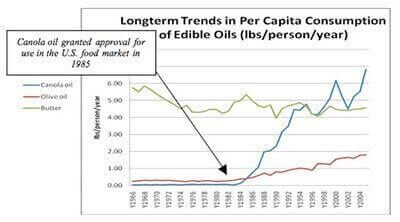
And the rise in soybean oil production and consumption:
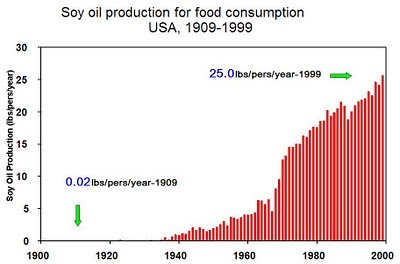
And corn oil:
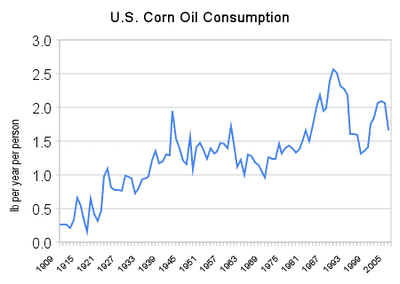
As an interesting correlation, check out the rates of heart disease and cancer since then. As this article notes:
All one has to do is look at the statistics to know that it isn’t true. Butter consumption at the turn of the century was eighteen pounds per person per year, and the use of vegetable oils almost nonexistent. Yet cancer and heart disease were rare. Today butter consumption hovers just above four pounds per person per year while vegetable oil consumption has soared–and cancer and heart disease are endemic.
Since the 1950s these vegetable oils and their derivatives have been increasingly used in processed foods and for frying or cooking. They are marketed as healthy because they contain monounsaturated fats and some level of omega-3 fatty acids.
What’s Wrong With Vegetable Oils?
There are many problems with vegetable oil consumption, and in my opinion, no amount is safe. To understand why, let’s look at a few of the biggest problems with vegetable oils:
Our Bodies Aren’t Meant to Consume Them!
The fat content of the human body is about 97% saturated and monounsaturated fat, with only 3% polyunsaturated fats. Half of that three percent is omega-3 fats, and that balance needs to be there. Vegetable oils contain very high levels of polyunsaturated fats, and these oils have replaced many of the saturated fats in our diets since the 1950s.
The body needs fats for rebuilding cells and hormone production, but it has to use the building blocks we give it. When we give it a high concentration of polyunsaturated fats instead of the ratios it needs, it has no choice but to incorporate these fats into our cells during cell repair and creation.
The problem is that polyunsaturated fats are highly unstable and oxidize easily in the body (if they haven’t already oxidized during processing or by light exposure while sitting on the grocery store shelf). These oxidized fats cause inflammation and mutation in cells.
In arterial cells, these mutations cause inflammation that can clog arteries. When these fats are incorporated into skin cells, their mutation causes skin cancer. (This is why people often get the most dangerous forms of skin cancer in places where they are never exposed to the sun, but that is a topic for another day!)
When these oils are incorporated into cells in reproductive tissue, some evidence suggests that this can spur problems like endometriosis and PCOS. In short, the body is made up of saturated and monounsaturated fats, and it needs these for optimal health.
Vegetable Oils Contain High Levels of Omega-6 Fatty Acids
I’ve talked before about how the body needs omega-3 and omega-6 fats in balance, preferably a 1:1 ratio. Most people consume a much higher ratio of omega-6 fats, and this can lead to problems.
Vegetable oils contain a very high concentration of omega-6 fatty acids and polyunsaturated fats, which cause an imbalance of these oils in the body. Omega-6 fats are easily oxidized with heat or light exposure. This is another reason that when these types of fats/oils are incorporated into tissue like skin cells, the heat and light from sun exposure can increase skin cancer risk.
Unbalanced levels of omega-3 and omega-6 fats have been linked to skin cancer and many types of cancers. As a recent article from the Institute of Natural healing explains:
In one study performed at the University of Western Ontario, researchers observed the effects of ten different dietary fats ranging from most saturated to least saturated. What they found is that saturated fats produced the least number of cancers, while omega-6 polyunsaturated fats produced the most. Numerous other studies have also shown that polyunsaturated fats stimulate cancer while saturated fat does not1 and that saturated fats do not break down to form free radicals.2
In another study, Dr. Vivienne Reeve, PhD, Head of the Photobiology Research Group at the University of Sydney irradiated a group of mice while feeding while feeding different groups of them polyunsaturated and saturated fats. She discovered that the mice that consumed only saturated fat were totally protected from skin cancer. Those in the polyunsaturated fat group quickly developed skin cancers. Later in the study, the mice in the saturated fat group were given polyunsaturated fats. Skin cancers quickly developed.
The 3% of our body that is made up of polyunsaturated fats is approximately half omega-3 fatty acids and half omega-6 fatty acids and our body needs this balance. omega-3s have been shown to reduce inflammation and be protective against cancer, while too much omega-6 fats cause inflammation and increase cancer risk.
Over time, consumption of these oils high in omega-6s and polyunsaturated fats can also lead to other problems, as the above article elaborates:
The journal Epidemiology published a study called, “Margarine Intake and Subsequent Coronary Heart Disease in Men.” Authors of the study followed participants of the Framingham Heart Study for 20 years and recorded their incidence of heart attack. They also tracked both butter and margarine consumption.
The researchers discovered that as margarine consumption increased… heart attacks went up. As butter consumption increased… heart attacks declined.
The study also divided the data into ten year increments. What they discovered is that during the first ten years, there was little association between margarine consumption and heart attacks. However, during the second decade of follow-up, the group eating the most margarine had 77% more heart attacks than the group eating none!
Hmm… saturated fats don’t cause heart disease and vegetable-based fats do! Sounds like something I’ve said before.
Imbalance of these fats can also cause damage to the intestines and along with processed grain consumption can set the body up for a host of food allergies and autoimmune problems.
Chemicals and Additives in Vegetable Oils and Fats
Since vegetable oils are chemically produced, it’s not really surprising that they contain harmful chemicals. Most vegetable oils and their products contain BHA and BHT (Butylated Hydroxyanisole and Butylated Hydroxytoluene) which are artificial antioxidants that help prevent food from oxidizing or spoiling too quickly.
These chemicals have been shown to produce potential cancer-causing compounds in the body, and have also been linked to liver/kidney damage, immune problems, infertility or sterility, high cholesterol, and behavioral problems in children.
Vegetable oils also contain residues of the pesticides and chemicals used in their growth and manufacture and most often come from genetically modified sources.
Reproductive Problems and Problems in Children
Vegetable oils are extremely damaging to the reproductive system and the developing bodies of unborn babies and children. Because the reproductive system in both men and women is constantly producing and dividing new cells, there is potential for mutation and problems when these cells are made of the wrong kind of fats and are oxidized.
This same thing applies to unborn babies and children, whose cells are dividing at high rates. There is more potential for mutation because there are more cells dividing. From this article:
What the scientific literature does tell us is that low fat diets for children, or diets in which vegetable oils have been substituted for animal fats, result in failure to thrive–failure to grow tall and strong–as well as learning disabilities, susceptibility to infection and behavioral problems. Teenage girls who adhere to such a diet risk reproductive problems. If they do manage to conceive, their chances of giving birth to a low birth weight baby, or a baby with birth defects, are high.
Excess consumption of vegetable oils also causes problems with hormone production, since hormones are dependent on certain fats for their manufacture. Vegetable oils that are hardened by hydrogenation to make shortening or margarine are especially damaging.
Other Effects of Vegetable Oils on the Body
Because vegetable oils oxidize easily, they deplete the body of antioxidants since the body must use these to attempt to neutralize the oxidation. People with high consumption of vegetable oils and their products are at risk for vitamin E deficiency and other deficiencies.
Vegetable oil consumption has been linked to a host of other problems, among them (from the same article above):
In test animals, diets high in polyunsaturates from vegetable oils inhibit the ability to learn, especially under conditions of stress; are toxic to the liver; compromise the integrity of the immune system; depress the mental and physical growth of infants; increase levels of uric acid in the blood; cause abnormal fatty acid profiles in the adipose tissues: have been linked to mental decline and chromosomal damage and accelerate aging. Excess consumption of polyunsaturates is associated with increasing rates of cancer, heart disease and weight gain.
In light of all that information, how do you sort out which oils are healthy, and which ones aren’t? Even more important, how do you know how much of each one to consume to be healthy?
Oils and Fats to Avoid
Vegetable oils and their fats should be avoided completely. There are much healthier alternatives and there is no reason or need to consume these types of fats. The main culprits to watch out for are:
- Canola Oil
- Corn Oil
- Soybean Oil
- “Vegetable” oil
- Peanut Oil
- Safflower Oil
- Cottonseed Oil
- Grapeseed Oil
- Margarine
- Shortening
- Any fake butter or vegetable oils products
There is no nutritional need for these oils and healthy fats can be found in higher amounts and better ratios in many other types of fats. This article has a great breakdown of the polyunsaturated, monounsaturated, and saturated content in the above oils.
While it is simple enough to avoid these oils themselves, the tougher challenge is avoiding all the foods they are in. Check out practically any processed food, and you will find at least one of these ingredients, often labeled as “partially hydrogenated corn/soybean/etc. oil” or “may contain soybean or canola oil.” These foods in particular often contain one of the above unhealthy oils:
- Salad dressings
- Store-bought condiments
- Mayo
- Chips
- Artificial cheeses
- Store-bought nuts and snacks
- Cookies
- Crackers
- Snack foods
- Sauces
- Practically anything sold in the middle aisles of the store
Oils and Fats to Use Freely
There are so many wonderful and healthy fats that are beneficial to the body, so there is no reason to consume the unhealthy ones above. Fats that can be consumed freely for optimal health are:
- Coconut Oil– Filled with medium chain fatty acids and lauric acid, coconut oil is an all-star of the saturated fats. Since the fat composition in cells in the body is largely saturated fat, it is important to get enough of it from healthy sources. Coconut oil does not oxidize easily at high temperatures or go rancid easily, making it a good choice for cooking and baking. It also makes a great natural moisturizer and can be substituted for butter.
- Meats – Meat, especially red meat, has gotten a bad rap, and unfortunately, the animals we eat have been as mistreated nutritionally as we have. Meats like grass fed beef and free range chicken has a very different nutritional profile than their feedlot counterparts. Grassfed and free range meats have higher nutrient levels, healthy forms of saturated fats and even omega-3s. If possible, consume these forms of meat.
- Butter– This one food is usually the one people are happiest to start using again. Butter tastes delicious, and pastured grass fed butter is an excellent source of fat soluble vitamins, healthy saturated fat and other nutrients. In contains a compound that Weston A. Price called Activator X, known to improve nutrient absorption and have preventative benefits against disease.
- Organic Cream– also a good source of healthy saturated fat, organic heavy cream is essentially liquid butter, and is great served whipped on top of fruit, in desserts or in cream based recipes.
- Olive Oil– High in monounsaturated fats and low in polyunsaturated fats, olive oil is a great oil for salad dressings, homemade mayo, and cold recipes. It shouldn’t be used for cooking since its high monounsaturated fat content makes it susceptible to oxidation at high temperatures.
- Palm Oil– Has a high saturated fat content and is also heat stable. Some sources claim that palm oil production often encroaches on the natural habitat of some endangered animals, though sustainable versions can be found. If in doubt, just use coconut oil.
- Avocados and Avocado Oil– A good source of monounsaturated fats and great on salads or in guacamole. Avocado oil is mild tasting and can be used in salad dressings.
- Fish– Fish is naturally high in omega-3 fatty acids and can help improve the omega-3/omega-6 balance in the body. Look for sustainable wild caught sources, and stick to small fish like tuna, sardines, salmon, etc to minimize mercury.
- Eggs– Another all-star in the healthy fats community, eggs are loaded with vitamins, healthy fats, and necessary cholesterol. Consume them daily from free-range sources.
Oils and Fats to Consume in Moderation
Some fats are nutritious and beneficial to the body but should still be consumed in moderation if they are eaten. Many contain high levels of Omega-6 fats and can therefore mess up the balance of fats in the body.
- Flaxseed Oil– Though it contains a good amount of omega-3s, it also has a lot of omega-6s and its high polyunsaturated fat content makes it prone to oxidation if heated. Fish oil is a much better source of omega-3s, and in general, I don’t recommend flax oil, though it certainly is not the worst option.
- Walnut Oil– Also high in omega-6 fats, but it has a great rich taste and can be safely used occasionally in dressings or desserts. It also has a slightly higher resistance to oxidation at higher temperatures than other nut oils.
- Sunflower Oil– Many brands with a reputation for health consider high oleic sunflower oil safe and even beneficial as it contains some of the same compounds as olive oil. However, most sunflower oils added to vegetable oil blends are not in this form, so I avoid it unless it’s from a company I trust. Short answer: it isn’t something I’d cook with in large amounts or consume by itself, but it isn’t on my no list and I consider true sunflower oil safe.
- Macadamia Nut Oil– This is one of my favorite tasting oils, but it is expensive. It is great in salad dressings or mayo. It has a lot of monounsaturated fats and low levels of polyunsaturated fats.
- Nuts– Most types of nuts (remember peanuts are not nuts) are a good source of protein and healthy fats and can be eaten in moderation without problem. Just check to make sure they haven’t been cooked in vegetable oils, which is often the case. Nuts also contain phytic acid, so consuming them in excess can be problematic for tooth and bone health.
What to Do With the Vegetable Oils You Have Already?
If you already have some of the unhealthy vegetable oils in your house… don’t eat them! I’m not a fan of waste either, so use them up in other ways. They can be used to make homemade playdough or floor cleaner. You can also stick them in your shed for oiling tools. (Did I mention, don’t eat them!)
This article was medically reviewed by Dr. Robert Galamaga, whois a board-certified internal medicine physician. As always, this is not personal medical advice and we recommend that you talk with your doctor or work with a doctor at SteadyMD.
Are you ready to throw out the vegetable oils? Still think canola oil is heart healthy? Share below!
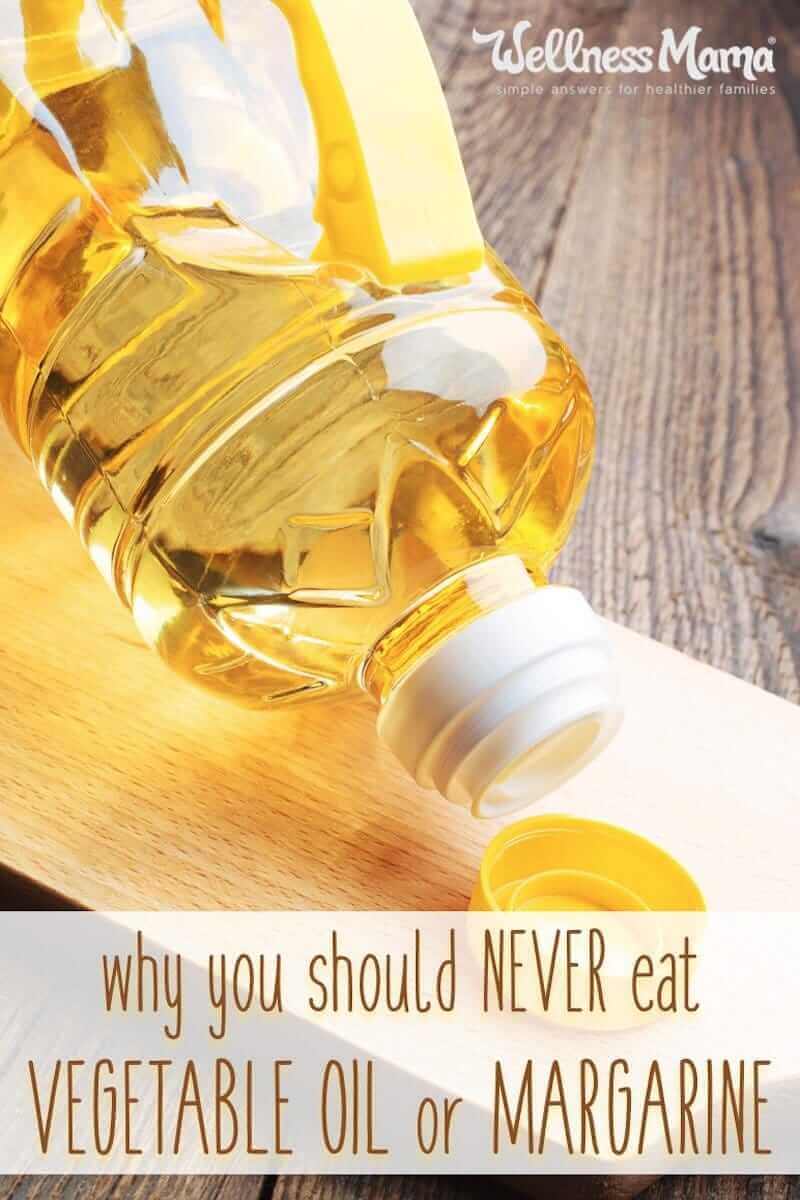

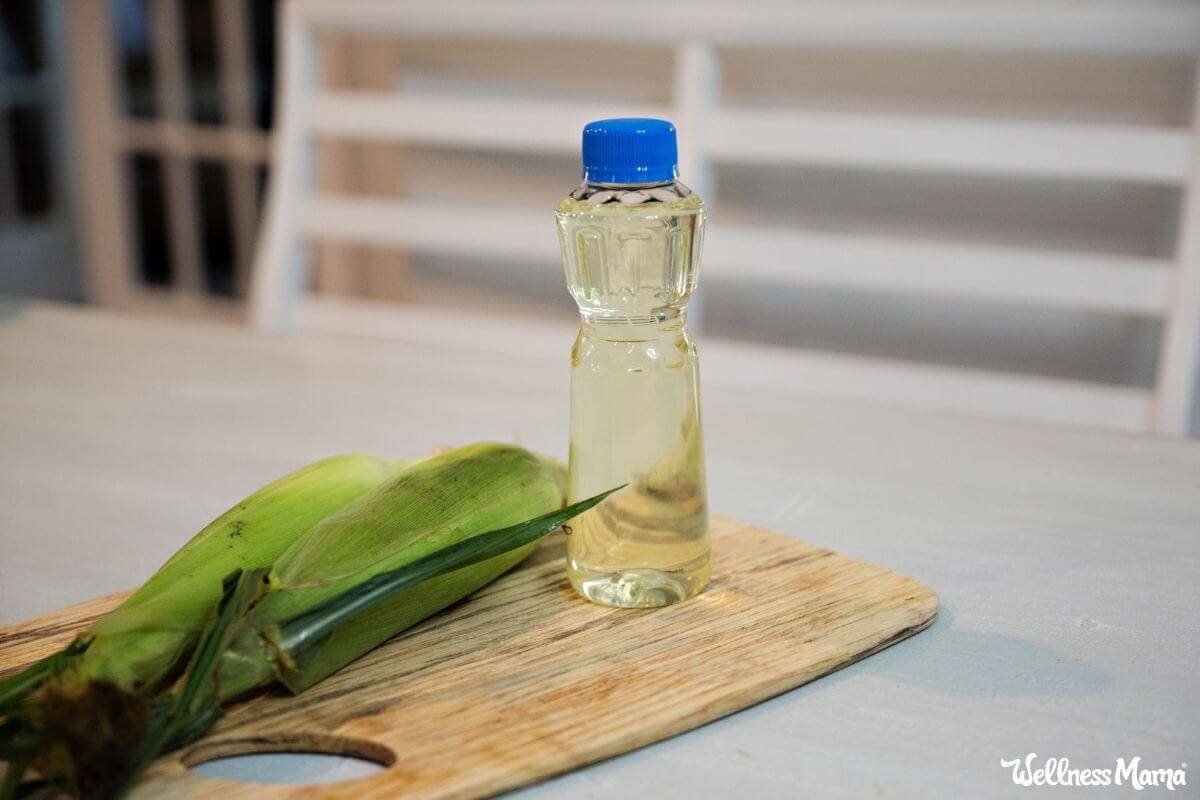


Leave a Reply